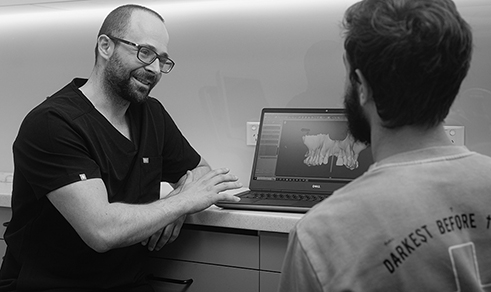
What are Dentoalveolar Surgery and Apicectomy?
Dentoalveolar surgery includes a variety of procedures focused on the alveolar process and the teeth. This type of surgery typically involves the removal of teeth, the treatment of impacted teeth, alterations to the bone to accommodate dentures, and the reshaping of the jawbone to place dental implants securely. An apicectomy, or root-end resection, is a specific form of dentoalveolar surgery that targets the root tips of the teeth. It is typically performed when a root canal fails due to persistent infection at the root tip, which cannot be resolved by standard endodontic treatments.
During an apicectomy, our surgeons carefully makes an incision in the gum tissue to expose the underlying bone and the root of the tooth. They then remove the infected root tip along with any surrounding infected tissue and seal the end of the root canal to prevent future infections. This procedure helps preserve the tooth and maintain oral health by removing sources of infection and inflammation.
The specialist surgeons at WestOMS work together to perform surgical procedures, taking into consideration the specific requirements of each patient and maintaining a focus on safety throughout the process.
Reasons for Having Dentoalveolar/Apicectomy Surgery
Patients considering dentoalveolar surgery or an apicectomy may require these procedures for various reasons. Common indications include impacted wisdom teeth that are causing pain or have the potential to cause infections; teeth that are severely decayed and beyond preservation by conventional root canal treatment; and roots with complex anatomies that traditional treatments cannot address. In addition, these surgeries may be necessary to prepare a patient’s mouth for further dental restorations such as implants or dentures, ensuring that the bone structure is adequate to support these devices.
These surgical interventions are crucial not just for alleviating immediate dental issues but also for preventing potential future complications such as jaw misalignment, chronic infection, and deterioration of bone structure around the teeth. They are performed to preserve as much of the natural dentition as possible, maintain the structural integrity of the jaw and teeth, and prepare the mouth for any necessary prosthetic devices.
Patients undergoing these procedures at WestOMS can expect thorough care throughout their treatment. The process begins with comprehensive diagnostic assessments, including detailed imaging, allowing for precise surgical planning. This pre-operative preparation is crucial to tailor the surgery to the specific conditions and anatomical features of each patient.
Our Experience and Approach to the Procedure
At WestOMS, our approach to dentoalveolar surgery and apicectomies is grounded in rigorous diagnostic protocols that use the latest imaging technologies. These technologies enable us to obtain detailed visualisations of dental and facial structures, which are essential for precise surgical planning and execution. Accurate mapping of these structures helps identify the specific needs of each case, allowing for interventions that are carefully tailored to the anatomical requirements of each patient.
Our clinic’s commitment to high standards of care is supported by our adherence to established clinical guidelines and protocols. This adherence ensures that every surgical procedure is conducted with meticulous attention to detail, prioritising the anatomical integrity and safety of the patient. Our team is continuously engaged in professional development and stays knowledgeable about the latest updates on surgical methods and technologies. This commitment to education allows us to implement the most appropriate surgical techniques for each procedure.
Moreover, our team’s experience is complemented by surgical facilities equipped with the latest technology. This combination of skilled personnel and modern technology enables us to handle a wide range of dentoalveolar and apical surgeries, from routine to complex cases. Each step of the surgical process is conducted with a focus on minimising impact on surrounding tissues, ensuring that we meet the specific procedural requirements.
What to Expect from the Procedure
Patients undergoing dentoalveolar surgery or an apicectomy at WestOMS will experience a thorough medical process, starting with an extensive pre-operative evaluation. This includes detailed imaging studies, such as X-rays or CT scans, to develop a clear and precise plan tailored to each patient’s specific dental conditions. This planning is essential for identifying the exact location and extent of the intervention needed.
During the procedure, local anaesthesia is administered to numb the area around the surgery site. Sedation options, ranging from mild sedatives to general anaesthesia, are also available depending on the complexity of the surgery and patient preferences.
The duration of the surgery varies based on the specific needs of the case, typically ranging from one to several hours. After the procedure, patients remain under observation until they are deemed stable. The recovery area staff monitors vital signs and provides initial post-operative care to manage any immediate discomfort. Before discharge, patients receive detailed instructions on how to care for the surgical site, manage pain, and recognise signs of potential complications, ensuring they are fully prepared for the recovery period at home.
Aftercare and Recovery
Recovery following dentoalveolar surgery or an apicectomy is crucial for healing and the prevention of complications. At WestOMS, patients are equipped with comprehensive aftercare instructions tailored to their specific procedures. These instructions typically include guidelines on maintaining oral hygiene, managing diet to avoid irritation at the surgical site, and correctly using prescribed medications to control pain and prevent infection.
After the surgery, follow-up appointments are a critical component of the recovery process. These sessions allow our surgeons to assess the healing progress, address any concerns, and adjust postoperative care if necessary. Patients are strongly advised to follow all provided postoperative care instructions and attend each scheduled follow-up visit. Adhering to these guidelines is essential for recovery and helps in the timely identification and management of any arising issues.
The specialist surgeons at WestOMS are committed to supporting patients throughout their recovery. This includes providing clear communication about what to expect during each phase of recovery and offering advice on how to manage daily activities while healing. The goal is to ensure that every patient receives the necessary care to promote healing and to help maintain their oral health over the long term.




